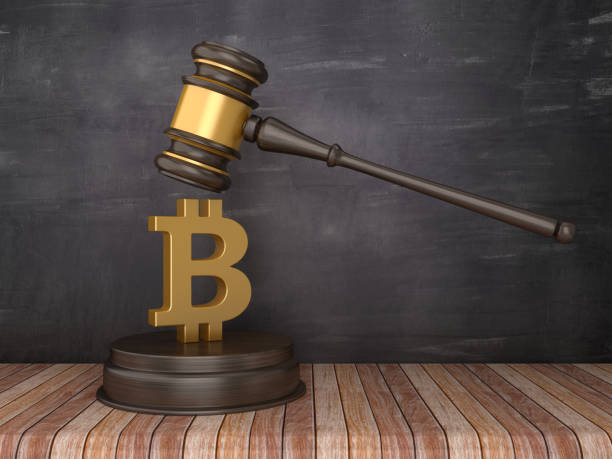Introduction
The world of blockchain technology is rapidly evolving, disrupting industries, economies, and even government systems. From cryptocurrencies like Bitcoin and Ethereum to innovative applications in healthcare, finance, and supply chains, blockchain’s potential is vast. However, as blockchain continues to revolutionize sectors, a pressing question arises: Are blockchain laws keeping up with technological innovation? This article explores the challenges and opportunities in regulating blockchain technology and how laws are evolving to address the unprecedented changes brought about by this transformative technology.

Understanding Blockchain Technology
At its core, blockchain is a decentralized ledger that enables secure, transparent, and immutable record-keeping. Unlike traditional centralized systems, blockchain operates across a network of computers, known as nodes, that work together to validate and record transactions. Each transaction is stored in a “block,” which is linked to the previous block, forming a chain. This structure ensures the integrity and security of the data.
Blockchain technology has quickly expanded beyond its initial application in cryptocurrencies. Its use now extends to various industries, including finance, supply chains, healthcare, and even governance. However, the rapid adoption of blockchain has outpaced the creation of regulations designed to address its complexities.
The Legal Landscape of Blockchain
As blockchain technology grows, so too does the need for comprehensive legal frameworks that can govern its use. However, the decentralized nature of blockchain presents unique challenges for lawmakers. Traditional legal systems are typically centralized, focusing on institutions, individuals, and jurisdictions that can be easily regulated. Blockchain, by contrast, operates across borders and often outside the reach of established laws.
Legal issues surrounding blockchain include questions of ownership, data privacy, intellectual property, and jurisdiction. For example, who owns the data stored on a blockchain? How do we protect users’ privacy in a system designed for transparency? And how do laws adapt to a technology that operates across borders, bypassing traditional regulatory structures?
The Challenges of Regulating Blockchain
One of the primary difficulties in regulating blockchain is the technology’s borderless nature. Unlike traditional businesses that operate within specific countries or jurisdictions, blockchain networks are decentralized, making it challenging for national governments to impose laws. Additionally, many blockchain applications, such as decentralized finance (DeFi) platforms, function without a central authority, further complicating the regulatory process.
Another challenge is the rapid pace of technological innovation. Blockchain technology is evolving at a pace that traditional legal systems struggle to match. The rise of new applications and platforms means that lawmakers must constantly play catch-up, creating a regulatory environment that may already be outdated by the time it is enacted.
Furthermore, the global nature of blockchain transactions means that laws must be harmonized across different countries to ensure consistency and avoid regulatory arbitrage. Different countries have taken varying approaches to blockchain regulation, with some embracing it fully, while others are taking a more cautious approach or even banning certain applications, such as cryptocurrency trading.
Current Efforts in Blockchain Regulation
Despite the challenges, many countries have taken steps to regulate blockchain technology. For example, in the United States, the Securities and Exchange Commission (SEC) has begun to regulate digital assets like cryptocurrencies. Similarly, the European Union has introduced the Markets in Crypto-Assets (MiCA) regulation, which aims to create a comprehensive legal framework for crypto-assets across member states.
In Asia, countries like China and Japan have developed their own regulatory approaches to blockchain, with China focusing on central bank digital currencies (CBDCs) and Japan creating a legal framework for cryptocurrency exchanges.
These efforts reflect a growing recognition that blockchain technology is not only here to stay but will continue to evolve and impact a variety of sectors. However, the regulatory landscape remains fragmented, and further collaboration between governments and blockchain experts is necessary to create a more unified global regulatory approach.
Are Blockchain Laws Keeping Up with Innovation?
As blockchain technology continues to advance, the question remains: are laws keeping up with the pace of innovation? The reality is that while some progress has been made, legal frameworks are still lagging behind in many areas. For example, regulations surrounding new blockchain applications, such as smart contracts and decentralized finance, are still in their infancy.
Furthermore, many existing regulations fail to address the full scope of blockchain’s impact. Issues like digital identity, cross-border data flows, and the environmental impact of blockchain networks require further attention. While blockchain’s potential is undeniable, the legal system must evolve to accommodate the complexities introduced by this new technology.
One of the primary obstacles to effective regulation is the inherent tension between innovation and control. Lawmakers must strike a delicate balance between fostering innovation and protecting consumers, businesses, and the broader economy. Overly restrictive regulations could stifle the growth of blockchain technology, while a lack of regulation could lead to abuses, fraud, and financial instability.
The Future of Blockchain Regulation
The future of blockchain regulation will likely see more coordinated efforts among countries to create standardized legal frameworks. Increased collaboration between regulators, blockchain experts, and industry leaders will be crucial to developing effective laws that promote innovation while ensuring security, privacy, and fairness.
One promising development is the emergence of blockchain-based self-regulation models. By using smart contracts and decentralized governance structures, blockchain platforms could create their own rules and enforcement mechanisms, reducing the need for centralized regulatory bodies. This could be a game-changer in how blockchain is governed, offering a more adaptive and dynamic regulatory approach.
As blockchain technology continues to mature, legal systems will need to adapt to new challenges and opportunities. Laws will have to evolve to address issues like privacy, data protection, and the role of blockchain in public and private governance. Additionally, international cooperation will be essential to creating a cohesive legal framework that addresses the global nature of blockchain networks.
Conclusion
Blockchain technology is reshaping industries and societies, but the legal landscape has struggled to keep up with its rapid pace of innovation. While progress is being made in the development of blockchain regulations, significant challenges remain. The decentralized and borderless nature of blockchain, combined with the speed at which the technology evolves, makes it difficult for traditional legal systems to keep pace.
The future of blockchain regulation will likely involve more collaboration between governments, regulators, and blockchain innovators to create a legal framework that can address the unique challenges posed by this disruptive technology. Until then, the question remains: Are blockchain laws keeping up with technological innovation? Only time will tell, but it is clear that lawmakers must act swiftly and decisively to ensure that blockchain’s full potential is realized in a safe and secure environment.

qo9n04
b5c3dl
Si disfrutas el sector de las apuestas en Espana, estas en el sitio correcto.
Descubre los casinos con **proteccion avanzada, mejores bonos y juegos emocionantes**.
**?Que beneficios tienes en los casinos mas destacados de Espana?**
**Casinos regulados y regulacion espanola para una total tranquilidad.**
**Bonos de bienvenida exclusivos que no puedes perderte.**
**Ruleta, blackjack, tragaperras y mas con jackpots millonarios.**
**Depositos y retiros instantaneos con multiples metodos de pago.**
**?Quieres conocer la lista de los casinos mas recomendados?**
En nuestra guia hemos recopilado las **opiniones de expertos sobre los principales operadores de juego en Espana**: casinotorero.info
**Unete en un casino confiable y disfruta del juego ahora!**
Hello!
With a constantly evolving selection of games, boredom is never an option. Dive in daily to explore new adventures and seize every opportunity! https://monixplay.com/he9f83b35
k395a2
ZIoyqZqt GIvs EohWHM OdWpG ZXdFg xlC
txfru9
205se0
hk9bym
q9q7py
14ug9v
ulpqct
Восстановление бампера автомобиля — это популярная услуга, которая позволяет вернуть первоначальный вид транспортного средства после незначительных повреждений. Передовые технологии позволяют устранить сколы, трещины и вмятины без полной замены детали. При выборе между ремонтом или заменой бампера https://telegra.ph/Remont-ili-zamena-bampera-05-22 важно принимать во внимание масштаб повреждений и экономическую целесообразность. Профессиональное восстановление включает подготовку, грунтовку и покраску.
Смена бампера требуется при серьезных повреждениях, когда реставрация бамперов неэффективен или невозможен. Расценки восстановления варьируется от материала изделия, характера повреждений и модели автомобиля. Полимерные элементы поддаются ремонту лучше металлических, а современные композитные материалы требуют специального оборудования. Профессиональный ремонт увеличивает срок службы детали и поддерживает заводскую геометрию кузова.
При появлении трудности, я с радостью оказать поддержку по вопросам Ремонт бамперов в нижнем новгороде автозаводский – пишите в Телеграм uje01
b9rf2f
Your article helped me a lot, is there any more related content? Thanks!
s9is8j
Thanks for sharing. I read many of your blog posts, cool, your blog is very good. https://www.musical-u.com/learn/the-ultimate-guide-to-imposter-syndrome-for-musicians/#comment-44738
q22lhu
yarhtw
mga7fc
Your point of view caught my eye and was very interesting. Thanks. I have a question for you.
5hmllg
Thank you, your article surprised me, there is such an excellent point of view. Thank you for sharing, I learned a lot. https://accounts.binance.com/register-person?ref=P9L9FQKY
z191ec
Thank you, your article surprised me, there is such an excellent point of view. Thank you for sharing, I learned a lot. https://www.binance.info/pt-PT/join?ref=YY80CKRN
jl6ei4
I don’t think the title of your article matches the content lol. Just kidding, mainly because I had some doubts after reading the article.
7mr5qt
pl7wom
Can you be more specific about the content of your article? After reading it, I still have some doubts. Hope you can help me.